Data is an essential component of any marketer’s job. Paid ads data, customer behavior data, organic search data, and more can make it difficult to keep everything organized and useful.
To help you generate meaningful insights from your data, you’ve likely come across or used Funnel.io as a solution for aggregating your marketing data. But you’ve read some negative reviews or experienced issues regarding data reliability, pricing, and limited attribution capabilities.
The latter issue is particularly important—since multi-touch attribution and comprehensive data visibility helps marketing teams optimize spend and measure ROI accurately.
In this guide, we’ll cover a few tools that can serve as alternatives to Funnel.io. For each tool we’ll offer:
- A tool overview
- G2 rating
- Key features
- Pros
- Cons
- Pricing
Key takeaways
- You might be looking for a Funnel.io alternative because of issues with data reliability, onboarding complexity, and limited attribution functionality.
- The Attribution Platform is the best solution for unifying data alongside cost metrics to accurately measure ROI.
What Is Funnel.io?
Funnel.io is a marketing data collection platform that aggregates data from multiple sources. It gives you the option to export the aggregated data to another destination platform or use its own dashboards.
With these core functions, the main use case for Funnel.io is collecting data from disparate sources, normalizing it, and visualizing it in one place.
But while plenty of marketers find Funnel.io useful, reviews on G2 explain how the tool is expensive for what it does, especially given that they also experience some data reliability issues. You might then be looking for alternatives—which we’ll cover below.
Key Factors To Consider When Evaluating Funnel.io Alternatives
Considering the limitations of Funnel.io, when evaluating alternatives, those tools need to address and improve upon those limitations. Here are some criteria to keep in mind when looking at alternative tools:
- Reliable data integrations: The tool needs to offer simple data integrations, with minimal syncing errors to keep data accurate.
- Automation capabilities: The tool should have automation capabilities for reducing labor and risk of human error around manual reporting.
- Go beyond data aggregation: The platform should offer insights beyond just aggregating and normalizing your data. With multi-touch attribution capabilities, you’ll get more meaningful insights.
- Intuitive interfaces: The platform shouldn’t be confusing to use—the interface should empower non-technical marketing teams to gather insights without needing developer support.
- Responsive customer support: Tools aren’t perfect all the time. If you run into issues with onboarding or tool use, the platform should offer expert customer support to deal with issues quickly.
- Transparent pricing: The platform should offer pricing models that are easy to include in your marketing budget and align with business growth.
These criteria address the main issues marketers find with Funnel.io while also offering potentially better use.
6 Best Funnel.io Alternatives
The alternative tools we’ll be covering in this guide include:
- The Attribution Platform
- Supermetrics
- Adverity
- Improvado
- Dataddo
- Zoho Analytics
Each of these tools offer similar functionality with pros and cons in comparison to Funnel.io.
The Attribution Platform
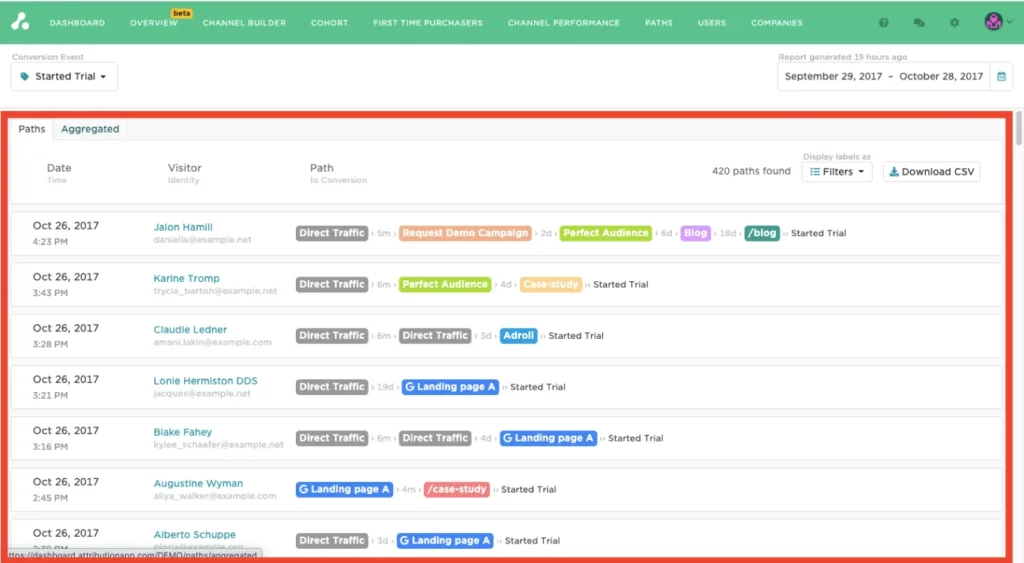
Tool overview
The Attribution Platform is a comprehensive marketing measurement platform that goes beyond basic data aggregation. It offers you and your team a single source of truth for marketing spend, performance, and revenue attribution.
Using the platform, you can connect marketing activities directly to revenue outcomes through advanced attribution modeling—which can either come out-of-the-box, or you can create a custom attribution model.
By connecting your ad platforms, CRM, organic traffic, and other relevant touchpoints (with cost data), you get a holistic view of the full funnel customer journey. These insights help you figure out which marketing channels are worth boosting the budget for, and which to depreciate with confidence.
G2 rating
Key features
- Automated data connectors for seamless integration with multiple ad platforms and CRMs.
- Real-time multi-channel attribution modeling that reveals the true impact of each marketing touchpoint.
- Customizable attribution models that adapt to different business needs and customer journeys.
- Unified performance view that combines data from all channels into actionable insights.
- Machine learning capabilities that improve attribution accuracy over time.
Pros
- Provides deeper insights than basic data aggregation through advanced attribution modeling.
- Offers highly accurate, data-driven attribution that reveals true channel performance.
- Features transparent cost insights and deep funnel visibility for better budget allocation.
- Presents an intuitive interface designed for non-technical marketing users.
- Delivers actionable recommendations for optimizing marketing spend based on attribution data.
Cons
- May be more attribution-focused than some businesses with simpler data aggregation needs.
- Advanced features require thoughtful initial setup to maximize value.
Book a Demo
Understand the precise impact of each marketing touchpoint and track “true” CAC, ROAS, and ROI on marketing spend with The Attribution Platform.
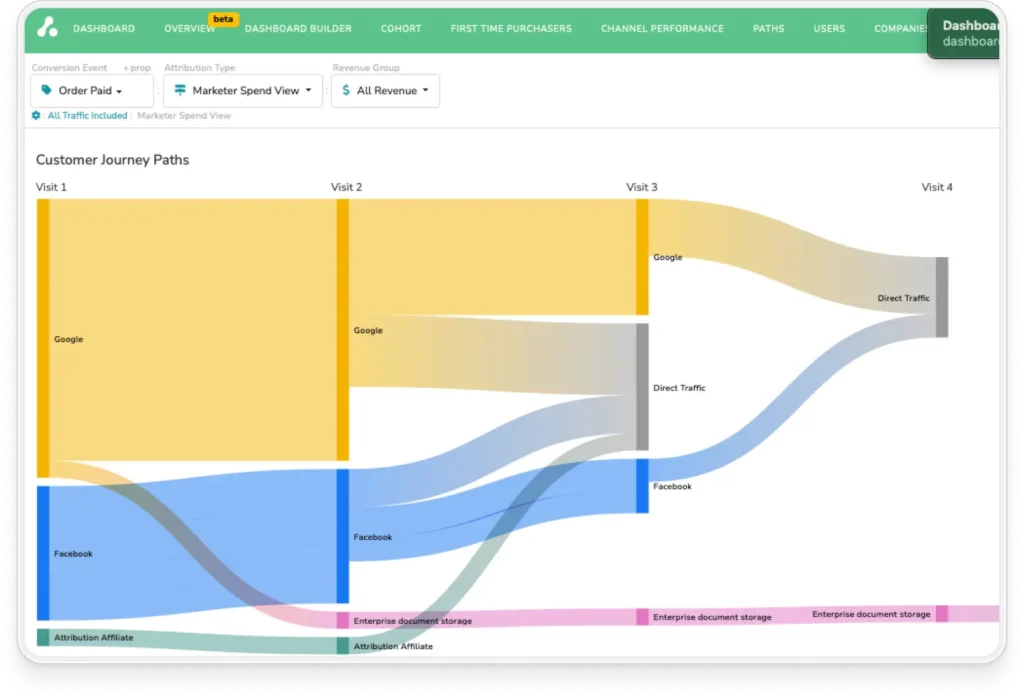
Supermetrics
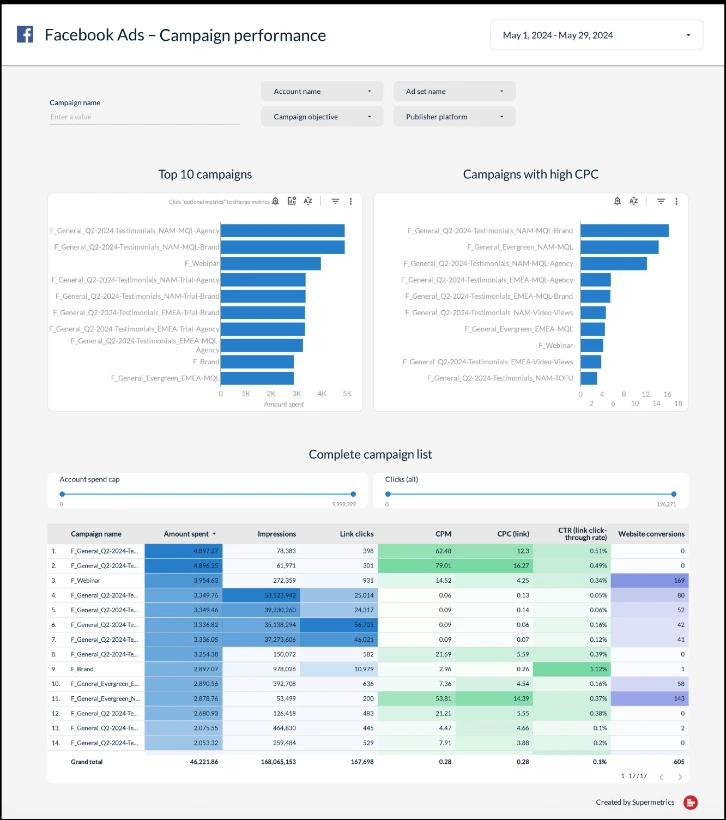
Image source: Supermetrics
Tool overview
Supermetrics is a similar tool to Funnel.io, where the primary function is data aggregation and analytics. The platform pulls marketing data into destinations like Google Sheets, Looker Studio, or other Business Intelligence (BI) tools.
If you use Google Looker Studio, you’ll have noticed the library of connectors offered by Supermetrics in the data connectors library.
Given how large the Supermetrics connectors library is, it’s no surprise that it’s one of the more popular tools for marketing reporting. However, the platform has limited attribution capabilities—so you’ll need to infer meaningful insights and marketing impact on revenue.
G2 rating
Key features
- Extensive connector library for paid ads, search, social, and other marketing platforms.
- Automated data refresh and scheduling options for regular reporting.
- Customizable reporting templates for spreadsheets or dashboards.
- Data transformation capabilities for normalizing marketing metrics.
Pros
- Quick setup process for aggregating cross-channel marketing data.
- Flexible usage across multiple data destinations (spreadsheets, BI tools, etc.).
- Strong documentation and community support resources.
- Regular updates to connectors as marketing platforms evolve.
Cons
- Lacks built-in advanced attribution modeling capabilities.
- Requires external tools or manual work for in-depth ROI analysis.
- Can experience occasional data sync issues with certain platforms.
- Limited ability to unify customer journey data across touchpoints.
Pricing
See Supermetrics pricing for details. Each plan includes only one destination platform.
- 14-day free trial available for testing a connector.
- Starter: From $37/month billed annually, up to two data sources.
- Growth: From $177/month billed annually, up to five data sources.
- Business: Contact Supermetrics for pricing, custom data sources.
Adverity
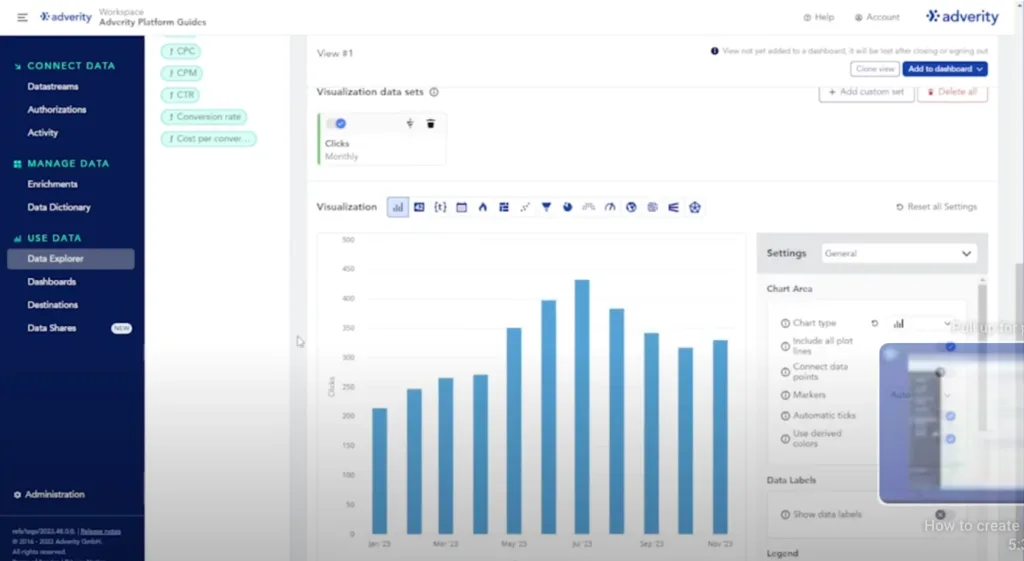
Image source: Adverity
Tool overview
Similarly to Supermetrics, Adverity offers a robust data intelligence platform with ETL and analytics capabilities.
Like other BI tools, it provides integrated data collection, transformation, and visualization for marketing teams—but it also offers a conversational AI feature for finding answers to your questions about the data.
With advanced ETL capabilities, Adverity offers an enterprise-focused approach to marketing analytics—as a result, it might be an overkill option for smaller businesses.
G2 rating
Key features
- Automated data ingestion from multiple marketing sources with extensive connector library.
- Advanced data transformation tools for cleaning and normalizing marketing data.
- Unified data modeling with custom dashboard creation options.
- AI-driven insights and anomaly detection for marketing performance.
- Data governance and compliance features for enterprise requirements.
Pros
- Intuitive user interface for setting up complex data flows and transformations.
- Scalable solution well-suited for enterprise marketing teams with diverse data needs.
- Strong data visualization capabilities for creating comprehensive marketing dashboards.
- Robust data quality monitoring and error notification system.
Cons
- Steeper learning curve compared to simpler alternatives, especially for smaller teams.
- May require additional expertise or configuration for advanced attribution modeling.
- Higher price point that may not fit smaller marketing budgets.
- Can be complex to implement all available features effectively.
Pricing
Adverity pricing is custom tailored to each client—so there are no publicly available pricing options.
Improvado
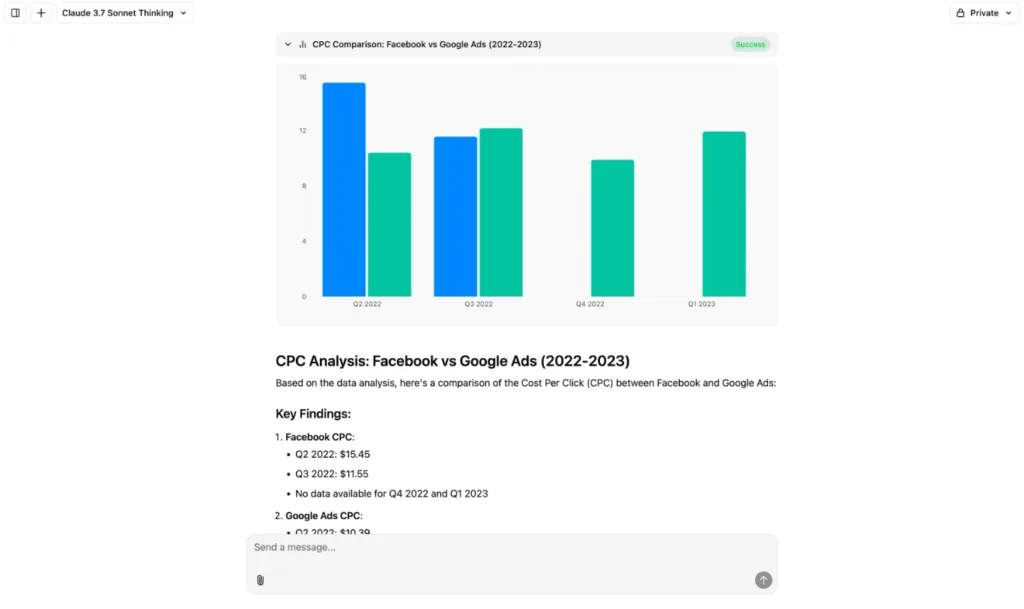
Image source: Improvado
Tool overview
Where Adverity is focused on advanced enterprise solutions, Improvado offers a marketing data aggregation and analytics solution focused on simplified reporting. Improvado does offer ETL capabilities for data unification, but its primary selling point is AI-driven, real-time reports and dashboards.
You can ask the platform using natural-language prompts to build reports from the data you’ve integrated, and it will also offer advice based on the report you’ve asked it to build.
Like other tools mentioned, you can use it as a marketing middleware solution for normalizing and loading data into your preferred data warehousing tool.
G2 rating
Key features
- Centralized marketing dashboard with automated data synchronization.
- Pre-built connectors for social, search, email, and other marketing platforms.
- ETL capabilities for transforming and normalizing marketing data.
- Customizable reporting views and visualization options.
- API access for custom integrations with other business systems.
Pros
- Significantly reduces manual reporting tasks, saving marketing team time.
- Strong customer support model with collaborative implementation approach.
- Handles large volumes of marketing data efficiently.
- Flexible data output options for various business intelligence tools.
Cons
- Limited multi-touch attribution capabilities without additional configuration.
- May require technical resources for complex implementation needs.
- Pricing structure may not be optimal for small marketing teams.
- Some users report challenges with data connectors.
Pricing
Improvado pricing figures are not publicly available, but do detail plan tiers such as Growth, Advanced, and Enterprise—alongside their features and usage limits on their pricing page.
Dataddo
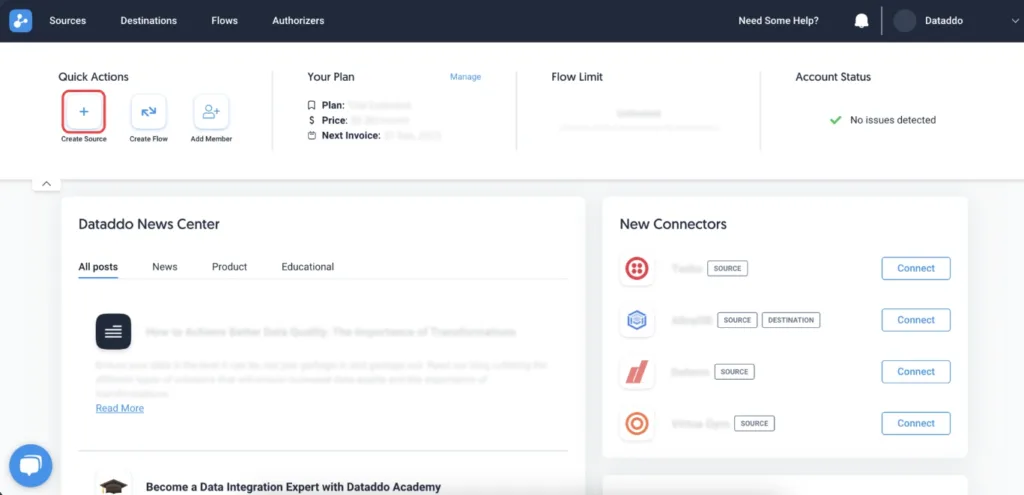
Image source: Dataddo
Tool overview
Dataddo is also an integration platform for streaming data from several marketing sources.
The platform specializes in real-time data synchronization with a flexible data connector system. It also offers a team of engineers who proactively monitors and maintains data pipelines.
As added value, the folks behind the platform promise that if you can’t find a connector you need among its library of 300+ existing connectors, they’ll build custom connectors on request in around 10 business days.
G2 rating
Key features
- Comprehensive scheduling and automation options for marketing data transfers.
- Broad connector library covering major marketing platforms and data destinations.
- Data transformation tools for cleaning and normalizing marketing metrics.
- Secure handling protocols for sensitive marketing and customer data.
- Monitoring tools for data pipeline performance.
Pros
- User-friendly interface designed for marketing professionals without technical expertise.
- Transparent monitoring of data pipelines with error notifications.
- Flexible deployment options including cloud and on-premises.
- Regular addition of new connectors as marketing platforms evolve.
Cons
- Functions primarily as an ETL tool without deeper attribution modeling capabilities.
- May require supplementary analytics platforms for comprehensive marketing insights.
- Limited visualization capabilities compared to end-to-end analytics solutions.
- Some advanced features require technical configuration.
Pricing
See Dataddo for pricing details. The platform offers tier-based pricing using the following plans:
- 14-day free trial available.
- Data-to-Dashboards™: From $99/month billed annually, minimum five sources included. This option is only for syncing data to visualization tools.
- Data Anywhere™: From $99/month billed annually, minimum three data sources included. This option is for syncing data to any destination platform.
- Enterprise: Contact Dataddo for pricing.
Zoho Analytics
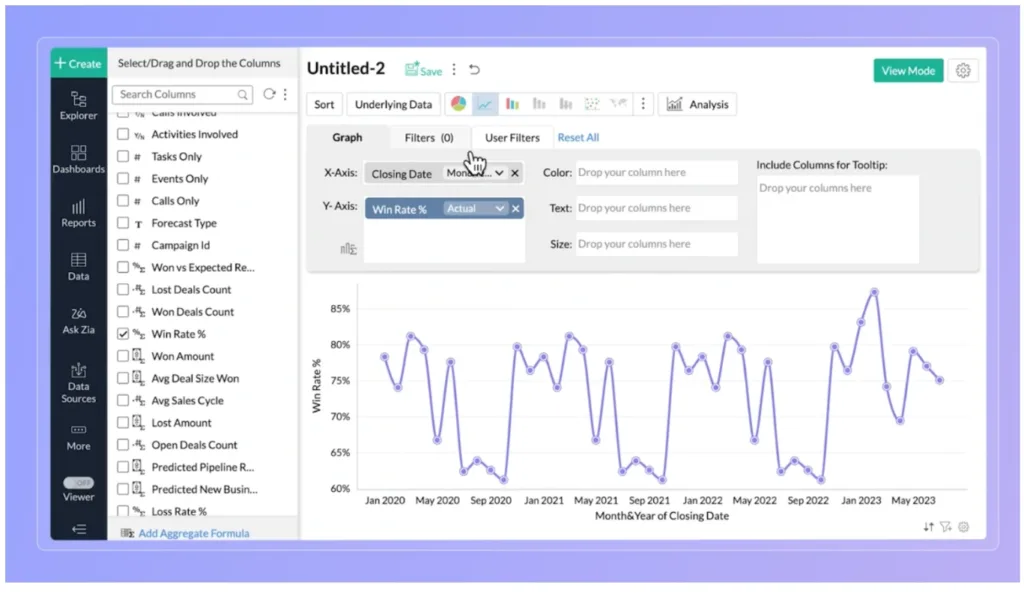
Image source: Zoho Analytics
Tool overview
If your business already uses any other tools from Zoho’s broader business suite, like its CRM or email service, then Zoho Analytics would be a natural solution to choose.
Similar to others, it unifies data through native and third-party connectors with options to analyze and visualize the data in-platform. Unlike other tools on this list, Zoho offers both a cloud-based and on-premises version of its platform—making it one of the most affordable options with broader business applications.
G2 rating
Key features
- Pre-built marketing dashboards and self-service analytics capabilities.
- Native integration with other Zoho products (CRM, Campaigns, etc.).
- Collaboration tools for sharing marketing insights with stakeholders.
- AI-powered analysis for detecting patterns in marketing performance data.
- White-labeling options for agencies and client reporting.
Pros
- Affordable pricing structure, especially for smaller businesses or existing Zoho suite users.
- Simple interface for creating custom marketing reports without technical expertise.
- Strong data visualization capabilities with numerous chart and graph options.
- Regular feature updates and platform improvements.
Cons
- Less specialized for marketing attribution compared to dedicated solutions.
- May require additional integrations to match enterprise-level attribution needs.
- Some advanced features have a steeper learning curve.
- Limited depth in certain marketing-specific connectors.
Pricing
See Zoho Analytics for pricing details. The platform offers their services both on the Cloud and On-Premises:
Cloud:
- Basic: From $24/month billed annually.
- Standard: From $48/month billed annually.
- Premium: From $115/month billed annually.
- Enterprise: From $455/month billed annually.
- Custom: Contact Zoho Analytics for pricing.
On-Premises (local server):
- Personal: Free forever for up to one user.
- Professional: $30/user/month billed annually. **
There are different pricing options for using On-Premise AWS, Azure, or Docker servers.
How To Choose The Right Funnel.io Alternative For Your Needs
We offered a list of criteria to use for evaluating different Funnel.io alternatives at the beginning of this guide. As a reminder, we suggested looking for:
- Reliable data integrations.
- Automation capabilities.
- Go beyond data aggregation.
- Intuitive interfaces for non-technical users.
- Responsive customer support.
- Transparent pricing.
Beyond these criteria, we suggest evaluating the current complexity of your marketing tech stack and number of data sources. Many Funnel.io alternatives base their pricing on the number of data sources you use—so adding more data sources will cost considerably more in many cases.
In the spirit of getting more “bang for your buck”, you should think about overlapping uses—look for tools that offer more than just data aggregation, such as attribution insights.
You should also consider your team’s technical capabilities and need for ease of use—some tools need developer support while others don’t.
We recommend requesting demos and trials with each tool you narrow your choices down to test real-world performance with your data. With this approach, the only resource you lose is time for testing.
Make Your Unified Data Useful With Attribution Insights
Each alternative to Funnel.io addresses its limitations through stronger data connectivity, improved reporting, or better usability.
Platforms with built-in multi-touch attribution offer a clear advantage by showing the full impact of marketing across channels. The Attribution Platform provides the most complete solution by combining automated data integration, advanced attribution modeling, and an intuitive interface.
The right choice depends on your organization’s needs, but The Attribution Platform offers unmatched capabilities for linking marketing performance to revenue.
Sign up and try Attribution today — pinpoint CAC by channel, audit funnels and conversion rates, scale revenue-driven content marketing, measure affiliate LTV and CAC (and more).

Funnel.io Alternatives FAQs
What are the most common reasons marketers switch from Funnel.io?
The most common reasons for switching from Funnel.io are data reliability, pricing, onboarding complexity, and limited attribution capabilities.
Which alternative provides the best onboarding and ongoing support?
The Attribution Platform offers dedicated onboarding and customer success management.
How does The Attribution Platform’s multi-touch attribution models differ from basic data aggregation?
The Attribution Platform offers multiple attribution models marketers can use for comparison and tailoring to their unique business needs. These models measure cost and performance data for accurate ROI insights—not just data aggregation.
